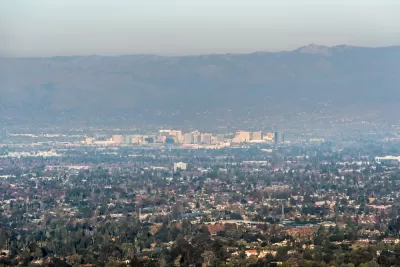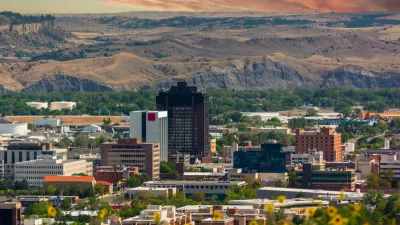The California city is the largest in the country to abolish parking requirements, joining a bevy of other localities that are shifting to less car-oriented development.

San Jose, California is the newest and largest U.S. city to abolish minimum parking requirements for new developments, easing the way for new housing construction and lowering the cost of building in the formerly car-oriented city. Reporting for the Mercury News, Eliyahu Kamisher explains that the city’s parking requirements, mostly unchanged since 1965, have been blamed for driving up housing costs, with parking spots costing upwards of $50,000 apiece to build.
Similar to other cities, “The new policy does not prevent developers from building parking lots but will allow them to ‘rightsize’ parking for new developments as they see fit. It also does not remove any current parking.”
With a population of 1 million people, San Jose is the largest U.S. city to remove parking minimums. “It is an especially big turnaround for a largely suburban community that has historically required businesses and developers to provide more on-site parking than any other major city in the state, according to a Bay Area News Group survey.” Now, new rules will require developers to include bicycle parking—“including one bike for every two lanes at bowling alleys and at least one bicycle spot for every 800 square feet at restaurants.”
FULL STORY: Bye-bye parking requirements: San Jose becomes largest city in U.S. to abolish minimum parking

Maui's Vacation Rental Debate Turns Ugly
Verbal attacks, misinformation campaigns and fistfights plague a high-stakes debate to convert thousands of vacation rentals into long-term housing.

Planetizen Federal Action Tracker
A weekly monitor of how Trump’s orders and actions are impacting planners and planning in America.

In Urban Planning, AI Prompting Could be the New Design Thinking
Creativity has long been key to great urban design. What if we see AI as our new creative partner?

California Creates Housing-Focused Agency
Previously, the state’s housing and homelessness programs fell under a grabbag department that also regulates the alcohol industry, car mechanics, and horse racing.

Chicago’s Ghost Rails
Just beneath the surface of the modern city lie the remnants of its expansive early 20th-century streetcar system.

Baker Creek Pavilion: Blending Nature and Architecture in Knoxville
Knoxville’s urban wilderness planning initiative unveils the "Baker Creek Pavilion" to increase the city's access to green spaces.
Urban Design for Planners 1: Software Tools
This six-course series explores essential urban design concepts using open source software and equips planners with the tools they need to participate fully in the urban design process.
Planning for Universal Design
Learn the tools for implementing Universal Design in planning regulations.
planning NEXT
Appalachian Highlands Housing Partners
Mpact (founded as Rail~Volution)
City of Camden Redevelopment Agency
City of Astoria
City of Portland
City of Laramie





























